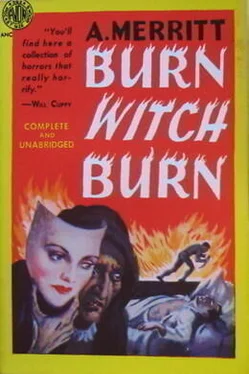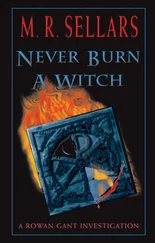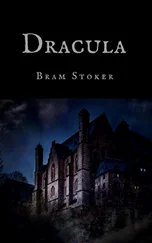Fire was leaping to them from draperies and curtains. The fire was leaping at them as though it were some vengeful spirit of cleansing flame!
We rushed through the door, the corridor, out into the shop. Through the corridor and into the shop the flames poured after us. We ran into the street.
Ricori cried: "Quick! To the car!"
Suddenly the street was red with the light of the flames. I heard windows opening, and shouts of warning and alarm.
We swung into the waiting car, and it leaped away.
Chapter XVIII
The Dark Wisdom
"They have made effigies comparable with my image, similar to my form, who have taken away my breath, pulled out my hair, torn my garments, prevented my feet from moving by means of dust; with an ointment of harmful herbs they rubbed me; to my death they have led me—O God of Fire destroy them!"
Egyptian Prayer
Three weeks had passed since the death of the doll–maker. Ricori and I sat at dinner in my home. A silence had fallen between us. I had broken it with the curious invocation that begins this, the concluding chapter of my narrative, scarcely aware that I had spoken aloud. But Ricori looked up, sharply.
"You quote someone? Whom?"
I answered: "A tablet of clay, inscribed by some Chaldean in the days of Assur–nizir–pal, three thousand years ago."
He said: "And in those few words he has told all our story!"
"Even so, Ricori. It is all there—the dolls—the unguent—the torture—death—and the cleansing flame."
He mused: "It is strange, that. Three thousand years ago—and even then they knew the evil and its remedy…'effigies similar to my form…who have taken away my breath…an ointment of harmful herbs…to my death they have led me…O God of Fire–destroy them!' It is all our story, Dr. Lowell."
I said: "The death–dolls are far, far older than Ur of the Chaldees. Older than history. I have followed their trail down the ages since the night Braile was killed. And it is a long, long trail, Ricori. They have been found buried deep in the hearths of the Cro– Magnons, hearths whose fires died twenty thousand years ago. And they have been found under still colder hearths of still more ancient peoples. Dolls of flint, dolls of stone, dolls carved from the mammoth's tusks, from the bones of the cave bear, from the saber– toothed tiger's fangs. They had the dark wisdom even then, Ricori."
He nodded: "Once I had a man about me whom I liked well. A Transylvanian. One day I asked him why he had come to America. He told me a strange tale. He said that there had been a girl in his village whose mother, so it was whispered, knew things no Christian should know. He put it thus, cautiously, crossing himself. The girl was comely, desirable—yet he could not love her. She, it seemed, loved him—or perhaps it was his indifference that drew her. One afternoon, coming home from the hunt, he passed her hut. She called to him. He was thirsty, and drank the wine she offered him. It was good wine. It made him gay—but it did not make him love her.
"Nevertheless, he went with her into the hut, and drank more wine. Laughing, he let her cut hair from his head, pare his finger–nails, take drops of blood from his wrist, and spittle from his mouth. Laughing, he left her, and went home, and slept. When he awakened, it was early evening, and all that he remembered was that he had drunk wine with the girl, but that was all.
"Something told him to go to church. He went to church. And as he knelt, praying, suddenly he did remember more—remembered that the girl had taken his hair, his nail parings, his spittle and his blood. And he felt a great necessity to go to this girl and to see what she was doing with his hair, his nail parings, his spittle, his blood. It was as though he said, the Saint before whom he knelt was commanding him to do this.
"So he stole to the hut of the girl, slipping through the wood, creeping up to her window. He looked in. She sat at the hearth, kneading dough as though for bread. He was ashamed that he had crept so with such thoughts—but then he saw that into the dough she was dropping the hair she had cut from him, the nail parings, the blood, the spittle. She was kneading them within the dough. Then, as he watched, he saw her take the dough and model it into the shape of a little man. And she sprinkled water upon its head, baptizing it in his name with strange words he could not understand.
"He was frightened, this man. But also he was greatly enraged. Also he had courage. He watched until she had finished. He saw her wrap the doll in her apron, and come to the door. She went out of the door, and away. He followed her—he had been a woodsman and knew how to go softly, and she did not know he was following her. She came to a crossroads. There was a new moon shining, and some prayer she made to this new moon. Then she dug a hole, and placed the doll of dough in that hole. And then she defiled it. After this she said:
"'Zaru (it was this man's name)! Zaru! Zaru! I love you. When this image is rotted away you must run after me as the dog after the bitch. You are mine, Zaru, soul and body. As the image rots, you become mine. When the image is rotted, you are all mine. Forever and forever and forever!'
"She covered the image with earth. He leaped upon her, and strangled her. He would have dug up the image, but he heard voices and was more afraid and ran. He did not go back to the village. He made his way to America.
"He told me that when he was out a day on that journey, he felt hands clutching at his loins—dragging him to the rail, to the sea. Back to the village, to the girl. By that, he knew he had not killed her. He fought the hands. Night after night he fought them. He dared not sleep, for when he slept he dreamed he was there at the cross– roads, the girl beside him—and three times he awakened just in time to check himself from throwing himself into the sea.
"Then the strength of the hands began to weaken. And at last, but not for many months, he felt them no more. But still he went, always afraid, until word came to him from the village. He had been right—he had not killed her. But later someone else did. That girl had what you have named the dark wisdom. Si! Perhaps it turned against her at the end—as in the end it turned against the witch we knew."
I said: "It is curious that you should say that, Ricori… strange that you should speak of the dark wisdom turning against the one who commands it…but of that I will speak later. Love and hate and power—three lusts—always these seem to have been the three legs of the tripod on which burns the dark flame; the supports of the stage from which the death–dolls leap…
"Do you know who is the first recorded Maker of Dolls? No? Well, he was a God, Ricori. His name was Khnum. He was a God long and long before Yawvah of the Jews, who was also a maker of dolls, you will recall, shaping two of them in the Garden of Eden; animating them; but giving them only two inalienable rights—first, the right to suffer; second, the right to die. Khnum was a far more merciful God. He did not deny the right to die—but he did not think the dolls should suffer; he liked to see them enjoy themselves in their brief breathing space. Khnum was so old that he had ruled in Egypt ages before the Pyramids or the Sphinx were thought of. He had a brother God whose name was Kepher, and who had the head of a Beetle. It was Kepher who sent a thought rippling like a little wind over the surface of Chaos. That, thought fertilized Chaos, and from it the world was born…
"Only a ripple over the surface, Ricori! If it had pierced the skin of Chaos…or thrust even deeper…into its heart…what might not mankind now be? Nevertheless, rippling, the thought achieved the superficiality that is man. The work of Khnum thereafter was to reach into the wombs of women and shape the body of the child who lay within. They called him the Potter–God. He it was who, at the command of Amen, greatest of the younger Gods, shaped the body of the great Queen Hat–shep–sut whom Amen begot, lying beside her mother in the likeness of the Pharaoh, her husband. At least, so wrote the priests of her day.
Читать дальше










